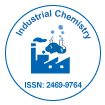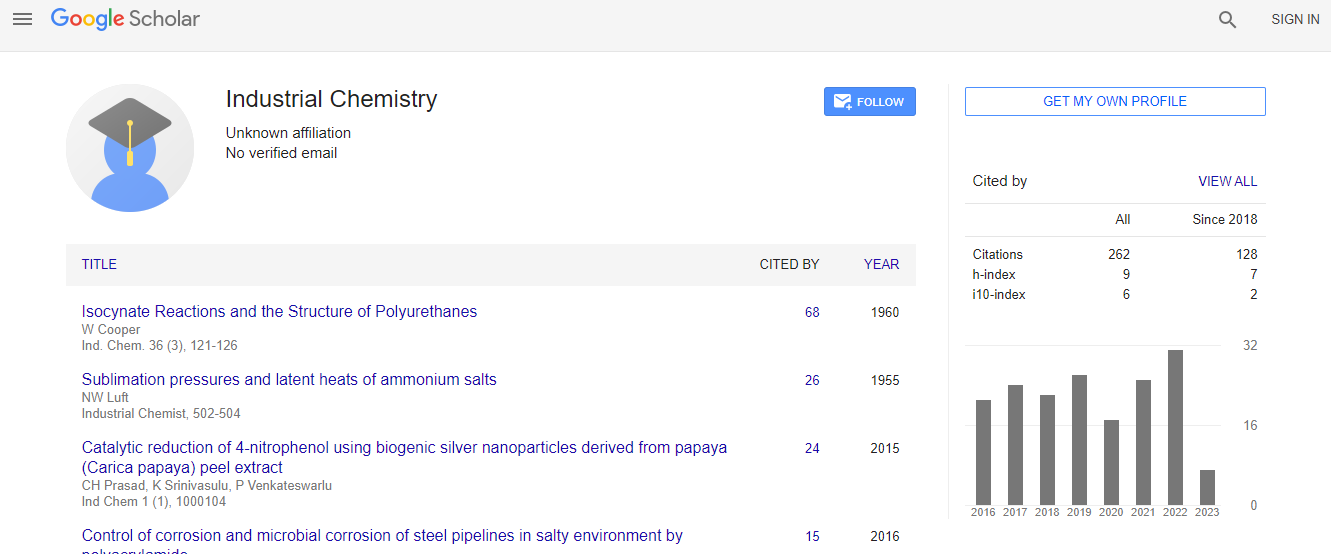Our Group organises 3000+ Global Conferenceseries Events every year across USA, Europe & Asia with support from 1000 more scientific Societies and Publishes 700+ Open Access Journals which contains over 50000 eminent personalities, reputed scientists as editorial board members.
Open Access Journals gaining more Readers and Citations
700 Journals and 15,000,000 Readers Each Journal is getting 25,000+ Readers
Google Scholar citation report
Citations : 262
Industrial Chemistry received 262 citations as per Google Scholar report
Indexed In
- Index Copernicus
- Google Scholar
- RefSeek
- Directory of Research Journal Indexing (DRJI)
- Hamdard University
- EBSCO A-Z
- OCLC- WorldCat
- Scholarsteer
- Geneva Foundation for Medical Education and Research
- Euro Pub
Useful Links
Recommended Journals
Related Subjects
Share This Page
Bacterial isolation capacity to metabolize organic waste from residual water
17th International Conference on Industrial Chemistry and Water Treatment
Rivera-Tapia A, Quintero-Morales D, Hernandez-Aldana F, Cedillo-Ram√?¬≠rez L and Lozada-Campos D
Benemerita Autonomous University of Puebla, Mexico University of Ottawa, Canada
Posters & Accepted Abstracts: Ind Chem
Abstract
Water pollution is an environmental problem; the waters are accompanied by organic matter, nutrients and trace amounts of metals. The physicochemical treatments allow partial removal of the organic load; however, the costs are high, therefore it is advisable the use of other processes as the biologic. Contaminated rivers represent an interesting source of microorganisms capable of degrading different substrates, considering candidates for isolation and purification processes used in contaminated water. The strategy of bioremediation technologies is the use of different metabolic pathways and increased degradation of native processes to eliminate or reduced the contaminating substances. The isolates were monitored in medium with different substrates (carbohydrates, proteins and glycerol). Nineteen bacterial isolates from the three monitored water bodies were obtained, the percentage of capacity to assimilate strains with different carbohydrates varied depending on the compound, 100% of the strains degraded dextrose and sucrose, degraded 86% starch, 66% casein and none of the isolates showed hydrolysis of gelatin and lipase production. Results are in close relation to the place where these bacteria were isolated; as different levels of contamination may influence the bacteria present characteristics to adapt to the use of a wide range of carbohydrates. Although the degradation of pollutants in nature is often the result of the activity of a microbial consortium rather than a single organism, the potential degrader consortium depends on the potential that microorganisms present individually in their interaction with specific pollutants, for this reason have isolated autochthonous capacity to remove organic matter is a pathway for future use.Biography
Rivera-Tapia A has completed his undergraduate and graduate studies at the Benemérita Autonomous University of Puebla, Mexico obtaining his Doctorate in Environmental Sciences in 2009, he began working at the same university from 1997 to date. He currently directs Master's and Doctoral theses in the areas of Environmental Science and Technology. His research areas focus on environmental problems and microbiological tests. He has published more than 10 articles related to the topic of wastewater characterization within the city of Puebla; and participated in more than 15 national and international congresses on topics focused on the area of Environmental Sciences.
Email:jart70@yahoo.com

 Spanish
Spanish  Chinese
Chinese  Russian
Russian  German
German  French
French  Japanese
Japanese  Portuguese
Portuguese  Hindi
Hindi 